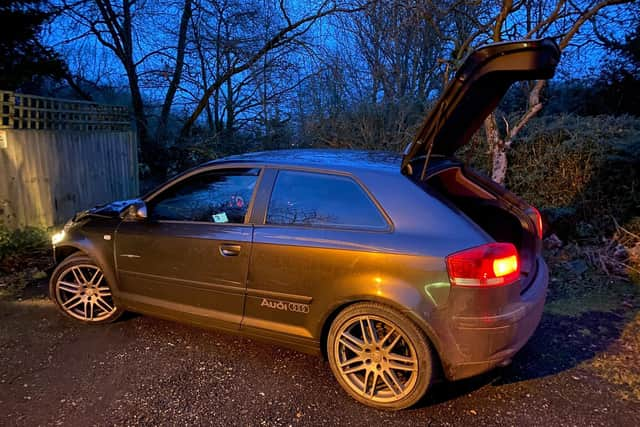Police helicopter helps chase down cloned Audi which sped off from police in Pudsey
and live on Freeview channel 276
The cloned Audi failed to stop for police in the Pudsey area, according to West Yorkshire Police's Roads Policing Unit (RPU).
The National Police Air Service (NPAS) helicopter for the north-east helped officers on the ground track the car.


Advertisement
Hide AdAdvertisement
Hide AdThe driver tried to run off but was chased by police and arrested for several offences, including drug driving.
A tweet from the RPU account on Wednesday, January 27, said: "Cloned Audi failed to stop for us in the Pudsey area. Driver detained and arrested for numerous offences including drug driving. Thanks to NPAS North East Region for their assistance."
The NPAS tweeted: "NPAS 82 assisted with the below job in Leeds this afternoon, great team effort to all involved, the two cops out and running would have given West Yorkshire Police dogs a run for their money."
What is car cloning? A guide from the RAC:
Car cloning is an illegal practice whereby criminals steal the identity of a legally registered vehicle and use it to hide the identity of a stolen or salvaged vehicle, which is often similar in model and appearance.
Advertisement
Hide AdAdvertisement
Hide AdCriminals then either attempt to sell the cloned vehicle or use it to carry out further crimes, ranging from motoring offences like speeding and parking illegally, to more serious crimes like ram-raiding and hit and runs.
If the cloned car is caught breaking the law, or involved in unlawful activity, these offences will often be attributed to the owner of the car that has been cloned.
How does car cloning work?
In order to clone a vehicle and hide the identity of a stolen or salvaged car, criminals either steal the number plates off a legally registered vehicle or, more commonly, have fake plates illegally produced.
These illegal plates are then attached to the stolen vehicle, meaning there are two vehicles with identical number plates on the road at the same time — one legal and the other illegally cloned.
Advertisement
Hide AdAdvertisement
Hide AdIf criminals try to sell the cloned car on to unsuspecting motorists, they may also produce fake car registration documents, such as the V5C Logbook, and could even alter the car’s Vehicle Identification Number (VIN).
On occasion, it can be almost impossible to tell if a vehicle has been cloned, especially if its VIN has been skillfully altered in each location.
What is a Vehicle Identification Number?
A VIN is a 17-digit number that identifies one specific vehicle, acting as a vehicle’s fingerprint because no two vehicles are produced with the same VIN.
A car’s VIN displays unique details of the vehicle, including the manufacturer and other specifications, and can be used to track all registrations, warranty claims, thefts and insurance policies taken out against the vehicle in question.
Advertisement
Hide AdAdvertisement
Hide AdThe VIN can be found on a metal plate under the bonnet, on the dashboard of the vehicle and driver’s door post and the number should always match the VIN in the vehicle title, V5C logbook and insurance premium.
How do I know if my car’s been cloned?
Unfortunately, unless your number plates have been physically stolen from your vehicle, you might have no idea your car’s been cloned until you receive a Penalty Charge Notice or fine for a motoring offence you didn’t commit.
In more serious circumstances, you might even be visited by the police if the cloned vehicle has been involved in a serious crime and the authorities believe you’re responsible.
What should I do if I think my car’s been cloned?
If you’re being accused of offences you haven’t committed and are worried your car’s been cloned, the first thing you should do is contact the organisation issuing the fines and explain your situation to stop them from pursuing the case.
Advertisement
Hide AdAdvertisement
Hide AdNext, you should contact both the police and Driver and Vehicle Licensing Agency (DVLA) and tell them you think your number plate has been cloned, providing them with all the relevant information you can.
Support the YEP and become a subscriber today. Enjoy unlimited access to local news and the latest on Leeds United, With a digital subscription, you see fewer ads, enjoy faster load times, and get access to exclusive newsletters and content. Click here to subscribe.
